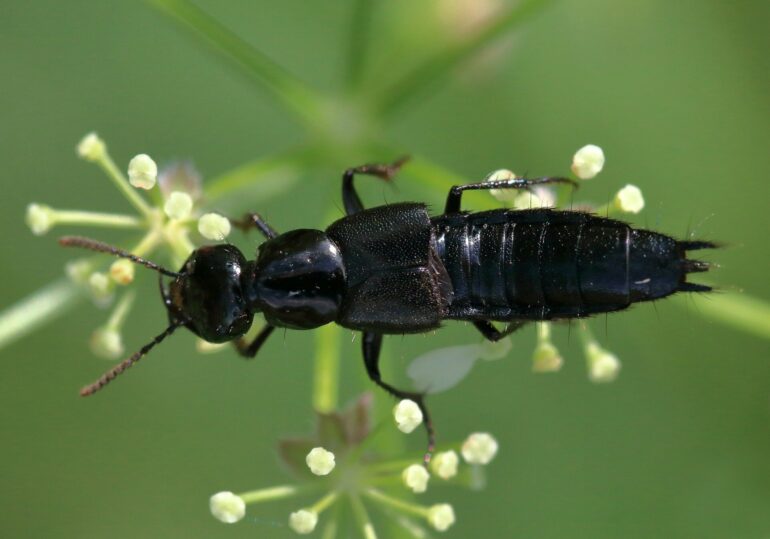Humans are having a devastating effect on biodiversity, but the impacts might be worse than we thought.
New research has found that undescribed species of beetles were much more sensitive to habitat destruction compared to known species, meaning we may be underestimating the effects of environmental damage on animals in tropical forests.
Insects make up a vast percentage of global biodiversity, but they are declining at an unprecedented rate.
Most insects are found in tropical forests, which are among the most threatened habitats in the world due to deforestation and climate change. But scientists have only described a fraction of the species that live in these forests, making it difficult to accurately assess the degree to which tropical species may be declining.
A recent study has revealed that populations of beetles that are currently unknown to science may be feeling the impacts of environmental damage more than species that have already been described.
Researchers collected rove beetles in an area of tropical forest in Borneo. Out of the 252 different species of beetle that were recorded, 76% were undescribed by science. After the forest had been logged, scientists found that the unknown species were more likely to have disappeared than the known species.
The results, published in the journal Current Biology, suggest that known beetle species are less vulnerable to habitat exploitation than unknown species.
Max Barclay, a Senior Curator of beetles at the Natural History Museum and an author of the study, says, “Insects are key indicators of the state of an ecosystem and can be used like a canary in a coal mine to show when biodiversity is declining. But not all insects behave the same.”
“Therefore, if we assess habitat damage based only on ‘known’ species, we will greatly underestimate the extent of the damage done as a result of human activities in tropical forests because we would not take into account the unknown species, which are more fragile and disproportionally affected.”
Why are unknown beetles more at risk of extinction?
Very little is known about insects in the tropics, with around 80% of tropical insect species still thought to be undescribed.
Species that are tough generalists are more likely to be known to scientists because they are more common, widespread and adaptable to environmental change.
In comparison, many unknown species get overlooked because they are often restricted to smaller areas and so much rarer. They are also likely to be more specialized toward a particular habitat and so are more sensitive to environmental change.
Most predictions about changes in insect biodiversity are based on well-studied animal groups with the assumption that similar, unknown species behave in the same way. But these unknown species may still play a key role in the maintenance of an ecosystem.
“Imagine if you had a forest in Scotland where there were red squirrels, Scottish wildcats and golden eagles,” says Max. “Now imagine the forest was cut down and replaced with a park, where there were rats, mice and pigeons.”
“There would still be two types of mammals and one kind of bird, so the biodiversity might be assumed to be the same. But rats, mice and pigeons are found everywhere while the other animals play a unique role in the ecosystem and are only found in a few places, so they are more at risk.”
“The problem here is that no one knows tropical beetles in such detail as we know birds and mammals.”
The result is that many of the known species of rainforest beetles are widespread generalists. According to Max this means the fact that they are still found at sites after logging is not that surprising.
But this shouldn’t be an indicator that the biodiversity is therefore fine. Other, more specialized species that were yet to have been described might have been lost—and these lesser-known species may be at least as important to that forest.
Are we facing an insect apocalypse?
Insects are fundamental to the survival of terrestrial ecosystems worldwide. They play an important role in recycling nutrients from dead animals and plants and act as important pollinators and a vital food source for many animals.
The dramatic rate at which insects are declining due to widespread habitat destruction, pollution and climate change has caused some to refer to current trends as an “insect apocalypse.”
In the U.K., studies show that flying insects have declined by 60% in just 20 years. Worldwide, more than 40% of insect species are declining with a third listed as endangered.
Losing large groups of insects, like beetles, will have detrimental effects on the world’s ecosystems, so there is an urgent need to understand more about these species before they disappear.
“There are 400,000 species of beetle that have so far been named by scientists,” says Max. “Beetles are the largest and richest group of organisms on the planet, and environments all over the world depend on them to maintain ecosystems.”
“Species are declining, and we don’t know what we are losing or the role they play within an ecosystem. Think of environmental destruction like a game of Jenga. You keep taking the pieces out of the tower, and you don’t know which piece you’re going to take out that will bring the whole structure down with it.”
“We destroy biodiversity at our peril, and this study shows that rates of destruction may actually be higher than current estimates suggest.”
More information:
Michael J.W. Boyle et al, Tropical beetles more sensitive to impacts are less likely to be known to science, Current Biology (2024). DOI: 10.1016/j.cub.2024.06.059
Provided by
Natural History Museum
This story is republished courtesy of Natural History Museum. Read the original story here.
Citation:
Tropical beetles unknown to science at higher risk of extinction, researchers warn (2024, August 22)



